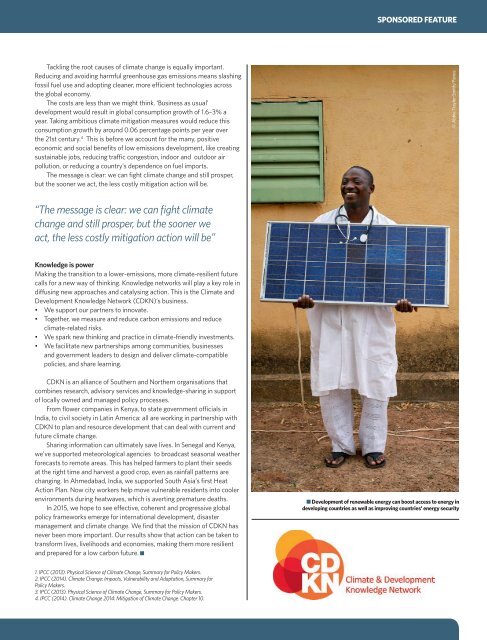FAMBB
FAMBB
FAMBB
You also want an ePaper? Increase the reach of your titles
YUMPU automatically turns print PDFs into web optimized ePapers that Google loves.
SPONSORED FEATURETackling the root causes of climate change is equally important.Reducing and avoiding harmful greenhouse gas emissions means slashingfossil fuel use and adopting cleaner, more efficient technologies acrossthe global economy.The costs are less than we might think. ‘Business as usual’development would result in global consumption growth of 1.6–3% ayear. Taking ambitious climate mitigation measures would reduce thisconsumption growth by around 0.06 percentage points per year overthe 21st century. 4 This is before we account for the many, positiveeconomic and social benefits of low emissions development, like creatingsustainable jobs, reducing traffic congestion, indoor and outdoor airpollution, or reducing a country’s dependence on fuel imports.The message is clear: we can fight climate change and still prosper,but the sooner we act, the less costly mitigation action will be.© Abbie Trayler-Smith/Panos“The message is clear: we can fight climatechange and still prosper, but the sooner weact, the less costly mitigation action will be”Knowledge is powerMaking the transition to a lower-emissions, more climate-resilient futurecalls for a new way of thinking. Knowledge networks will play a key role indiffusing new approaches and catalysing action. This is the Climate andDevelopment Knowledge Network (CDKN)’s business.• We support our partners to innovate.• Together, we measure and reduce carbon emissions and reduceclimate-related risks.• We spark new thinking and practice in climate-friendly investments.• We facilitate new partnerships among communities, businessesand government leaders to design and deliver climate-compatiblepolicies, and share learning.CDKN is an alliance of Southern and Northern organisations thatcombines research, advisory services and knowledge-sharing in supportof locally owned and managed policy processes.From flower companies in Kenya, to state government officials inIndia, to civil society in Latin America: all are working in partnership withCDKN to plan and resource development that can deal with current andfuture climate change.Sharing information can ultimately save lives. In Senegal and Kenya,we’ve supported meteorological agencies to broadcast seasonal weatherforecasts to remote areas. This has helped farmers to plant their seedsat the right time and harvest a good crop, even as rainfall patterns arechanging. In Ahmedabad, India, we supported South Asia’s first HeatAction Plan. Now city workers help move vulnerable residents into coolerenvironments during heatwaves, which is averting premature deaths.In 2015, we hope to see effective, coherent and progressive globalpolicy frameworks emerge for international development, disastermanagement and climate change. We find that the mission of CDKN hasnever been more important. Our results show that action can be taken totransform lives, livelihoods and economies, making them more resilientand prepared for a low carbon future.Development of renewable energy can boost access to energy indeveloping countries as well as improving countries’ energy security1. IPCC (2013). Physical Science of Climate Change, Summary for Policy Makers.2. IPCC (2014). Climate Change: Impacts, Vulnerability and Adaptation, Summary forPolicy Makers.3. IPCC (2013). Physical Science of Climate Change, Summary for Policy Makers.4. IPCC (2014). Climate Change 2014: Mitigation of Climate Change. Chapter 10.


